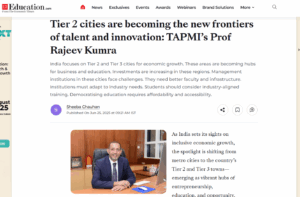Publication: The Hindu
Date: 13.07.2021
Pageview: 1,070,475
Author: Prof Sayan Mukherjee
With the advent of analytics and easy availability of large amounts of data, organisations are moving away from opinion and “gut-feeling” decision making to fact-based decision making.
Decision making is, in effect, like a cross-functional driver that affects all the functions of an organisation. Taking a decision within a siloed functional scope without considering its effects on other aspects may adversely impact the organisation. For example, if marketing commits a certain quantity of orders to customers without considering the impact on the production team, it may have serious consequences if the order cannot be met.
Decision science experts should not only be possess technical and analytical abilities but also have excellent business acumen, cross-functional knowledge, soft and problem-solving skills. Hence analytics education in India should be able to deliver and inculcate these skillsets. But how should educational courses in analytics and decision science space modify themselves to satisfy the industry needs and expectations?
Modifications
Programmes should innovate and strive to prepare industry-ready individuals. Stanton and Stanton propose the following six-point agenda that educational programmes can adopt for this:
- Provide real-world, on-the-ground experience to the students
- Inculcate certifications into the programmes
- Provide knowledge of data analysis and modeling techniques
- Develop coding skills
- Provide adequate soft-skill training
- Incorporate state-of-the-art software like R, Python, Tableau, SAS and so on in the curriculum.
Analytics and decision science are not theoretical in nature and can be better learnt if students can apply their learnings in the real-world context. Many business management-oriented, classroom-based courses try to achieve this through experiential learning pedagogies like case studies and simulations, capstone projects, and internships.
Though internships are the closest to real-world experience, yet they are not often as effective. Often interns are not entrusted with the same level of roles and responsibilities as full-time employees. The internship period is often too short to understand the intricacies of real-world challenges. Hence, the need is to have strong tie-ups with industry so that corporate organisations are invested in the students learning and provide active feedback in developing and shaping the future curriculum of the courses.
Educational institutes should also look into the possibility of delivering customised programmes for corporate organisations. This will also ensure that the corporates can employ the right candidate who can get started immediately.









